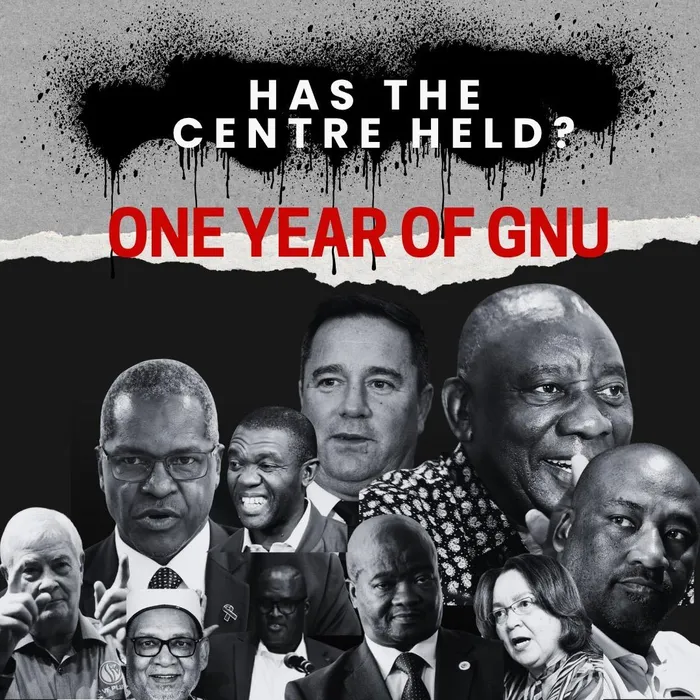GNU at war with itself: One year on, ANC-DA coalition faces mounting cracks and public distrust

The GNU has all the hallmarks of a marriage on the rocks. This includes a lack of trust, public display of disrespect and contempt for each other, and lack of commitment.
Image: IOL Graphics
One year after South Africa entered uncharted political territory with the formation of a Government of National Unity (GNU) following the ANC's 40 per cent showing at the polls, a fragile coalition is already showing deep fault lines — both within and without.
Formed in the wake of the May 2024 general elections — where the African National Congress (ANC) fell to 40.2% of the vote, losing its parliamentary majority for the first time in 30 years — the GNU was heralded as a pragmatic response to a fragmented electorate.
Instead, it has become a lightning rod for political tension, public distrust, and rising opposition fire.
The ANC, long dominant in South African politics, turned to the Democratic Alliance (DA), which secured 21.81% of the vote, along with smaller parties such as the Inkatha Freedom Party (IFP) and the United Democratic Movement (UDM), to form a broad coalition.
But it was a union born of necessity, not ideological harmony.
In an opinion piece published by IOL, political analyst, Professor Sipho Seepe, said the ANC's failures were fuelling DA's anti-transformation agenda.
The persistent bickering between the ANC and DA is to be expected. The GNU is, after all, a marriage of inconvenience. Neither party has ever expressed love for the other.
The GNU has all the hallmarks of a marriage on the rocks. This includes a lack of trust, public display of disrespect and contempt for each other, and lack of commitment.
Both parties have tried to argue that the GNU was born out of necessity.
A political analyst, Professor Dirk Kotze, said the GNU therefore has a serious challenge ahead of it.
In an opinion piece, Kotze said the GNU concept was caught in different political realities.
“The biggest exception is the ANC which is most divided on the GNU – take for example the ANC’s ministers who are defending the GNU in comparison with the stance of Panyaza Lesufi who is supporting it vocally but not acting by it,” he said.
He described Zille and ANC secretary-general, Fikile Mbalula’s fights as the GNU’s doom-and-gloom.
President Cyril Ramaphosa, the DA, Patriotic Alliance, and Freedom Front Plus are the GNU’s most vocal supporters, he said, adding that other partners like the IFP, UDM, PAC and al-Jamaah are less visible but still very much inside the GNU camp.
Disputes erupted almost immediately over the allocation of ministerial positions.
The ANC initially offered the DA six cabinet posts, including critical portfolios like Basic Education and Home Affairs.
But DA leader John Steenhuisen demanded more, igniting weeks of wrangling that weakened public confidence.
DA Federal Council chair Helen Zille defended the coalition as a “firewall” against an ANC-EFF-MK axis, saying, if we let a coalition of the ANC, MK, and EFF go into government, it would burn our hopes and dreams.
But the DA's continued friction with the ANC has made that firewall look increasingly unstable.
Meanwhile, opposition parties excluded from the GNU have seized the moment to stoke dissent.
The Economic Freedom Fighters (EFF), led by Julius Malema, have labeled the DA “the enemy,” while MK Party leader Jacob Zuma has accused the ANC of betraying the liberation struggle by partnering with former adversaries.
Tensions have escalated on economic fronts. The GNU’s recent decision to raise Value-Added Tax (VAT) to fund expanded social programs was met with sharp resistance from the DA, which voted against the national budget — a stunning move for a governing partner.
The EFF, in turn, hailed the budget rejection as a symbolic victory against neoliberalism.
Credit ratings agency Fitch has flagged the GNU’s internal instability and warned that any future overtures toward the EFF or MK Party could threaten South Africa’s economic trajectory.
The policy uncertainty and ideological divisions within the coalition raise red flags for investor confidence and fiscal discipline, it said in a recent note.
Despite passing key legislation in its first year, the GNU has struggled to present a coherent agenda. As the country marks one year of the GNU, South Africa stands at a political crossroads.
Will the GNU stabilise and mature into a model of inclusive governance? Or will internal fractures and mounting opposition prove fatal to this historic compromise?
The months ahead will determine whether unity holds — or collapses under the weight of unresolved contradictions.
Meanwhile, ActionSA, the EFF and MK Party have condemned the GNU, saying the priority was not people but business and capitalists.
IOL Politics